SPOTLIGHT: MYSTERIES OF THE DEAD
Top forensic pathologist looks back as Cape Town gets shiny new mortuary
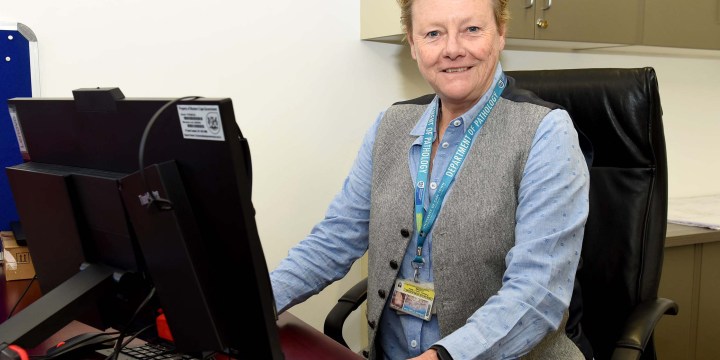
Mortuaries are grim places, yet Prof Lorna Martin, South Africa’s first woman to head a forensic medicine department, also visits mortuaries when she is on holiday. Martin spoke to Spotlight about her career working on high-profile cases and the nearly R300m Observatory Forensic Pathology Institute in Cape Town.
‘Forensic scientists act as custodians of the dead,” says Prof Lorna Martin. “We speak for them, explaining what happened in their last moments so justice can be done.”
For 35 years, Martin has hunched over stainless steel tables and trolleys with an assortment of tools, saws and scalpels, dissecting bodies, recording her observations in reports, pondering knots and ligatures, and testifying in court.
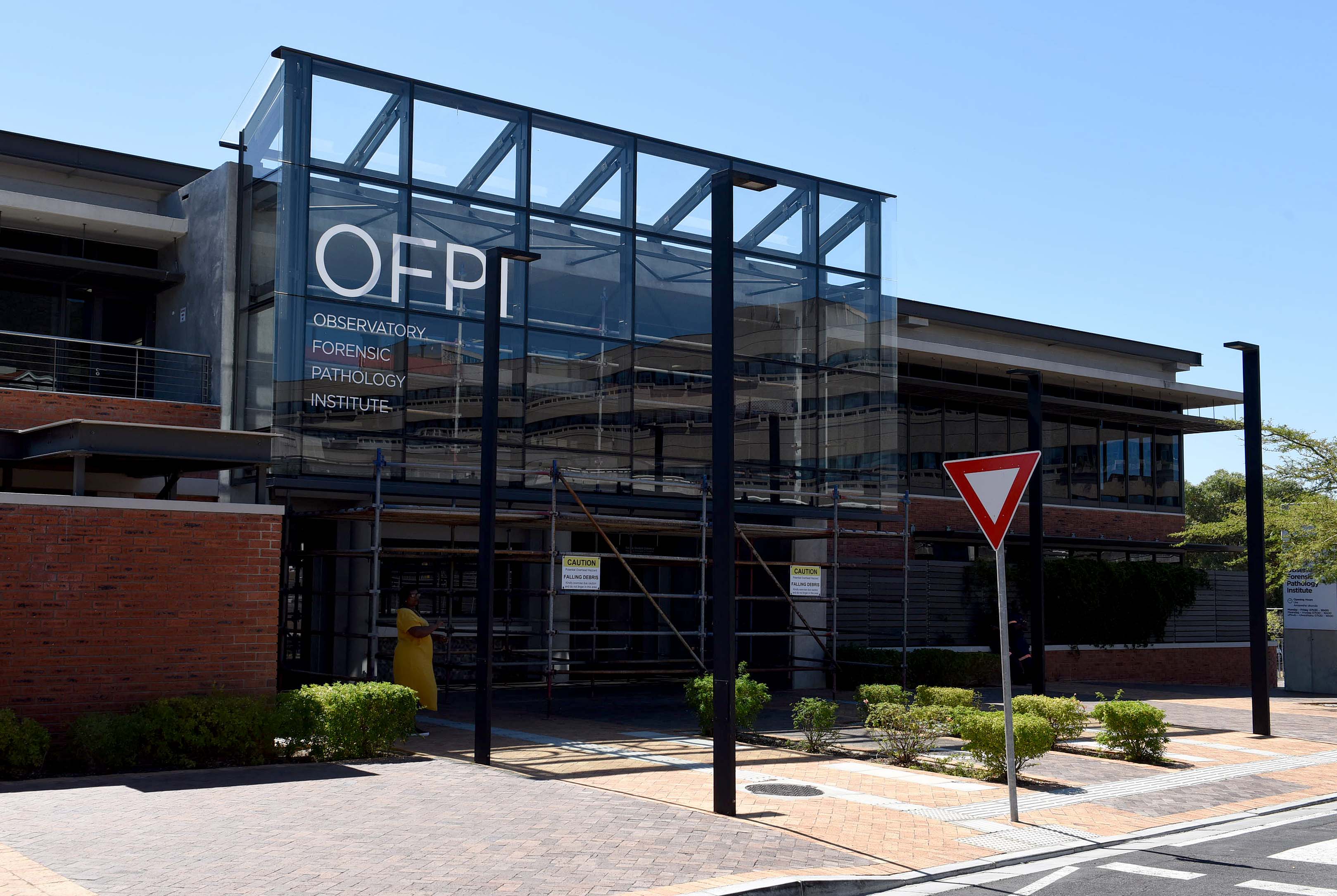
The Observatory Forensic Pathology Institute will officially be opened in April by health MEC Nomafrench Mbombo. (Photo: Nasief Manie / Spotlight)
Martin’s work has often been in the headlines.
Her autopsy of a decomposing 14-year-old girl’s body found DNA (a molecule that contains the genetic code that is unique to every individual) linked to Diepsloot serial killer Lazarus Mazingane, which helped authorities convict him in 2000.
On 20 January 2003, she entered the Sizzlers gay massage parlour in Sea Point where nine men had been tied up and killed.
In 2007, she told a legal inquest that the late British cricket coach Bob Woolmer had died of natural causes, contesting an original report of manual strangulation.
Shiny new facility
Over the past decade, Martin has been a driving force behind the state-of-the-art Observatory Forensic Pathology Institute (Ofpi), spanning three storeys adjacent to Groote Schuur Hospital.
Replacing Cape Town’s 1957 Salt River Mortuary – which was notoriously outdated and overfull, and described as a health hazard – the new facility will be opened by Western Cape Health MEC Nomafrench Mbombo in April.
Martin says the Ofpi has four large dissection areas with a ceiling height of five metres for ventilation and space for six autopsies each, plus an extra ventilated and secure BSL-3 (Biosafety level 3) section for dealing with deaths from TB and other contagious pathogens.
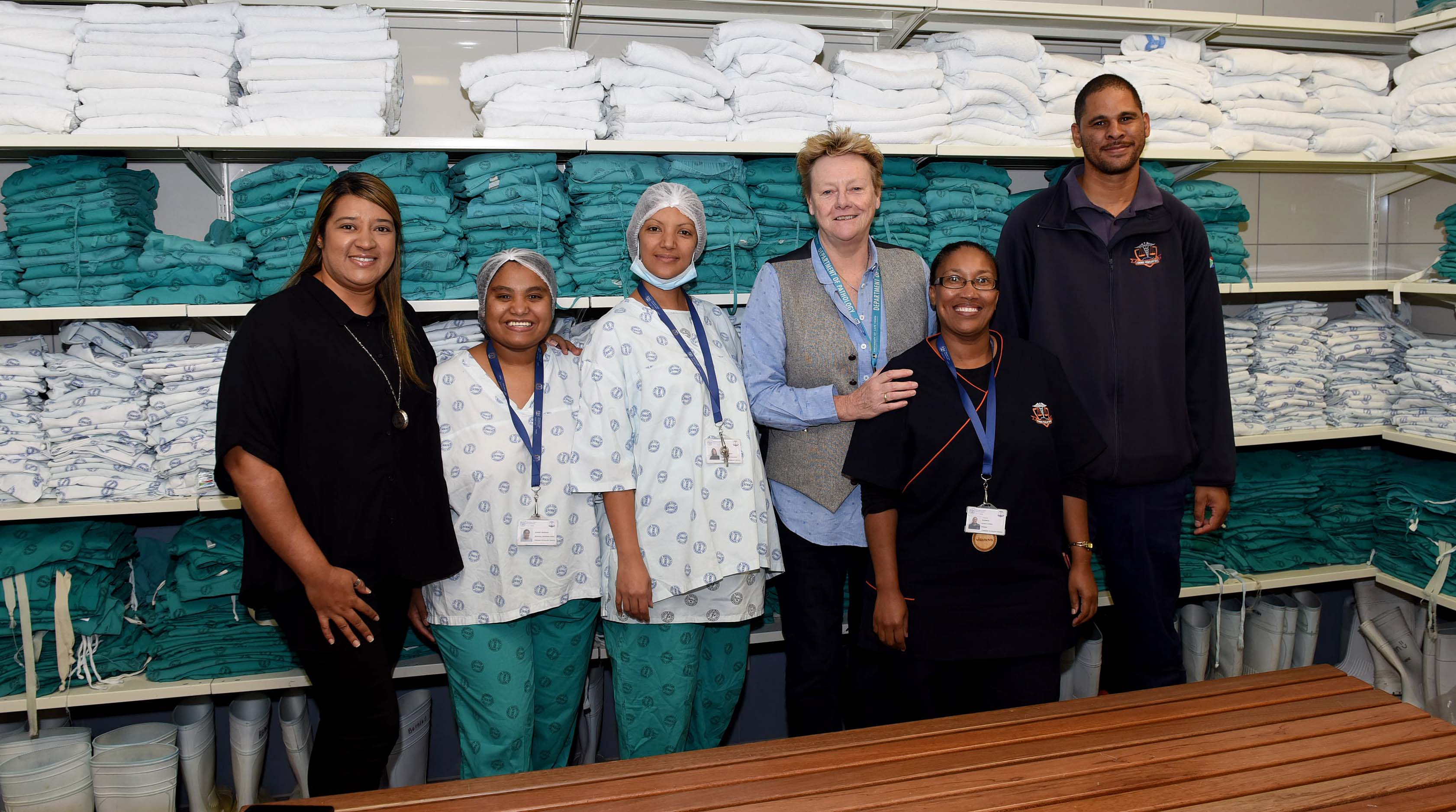
Professor Lorna Martin (third from right) and staff at the Observatory Forensic Pathology Institute. (Photo: Nasief Manie / Spotlight)
The nearly R300-million facility, which integrates provincial health’s Forensic Pathology Service and academic training, is finally operational, with a few last snags being fixed, she adds.
“Because of limitations in staff and other resources, we do between 15 and 20 autopsies daily. On any given day, we have between 20 to 30 autopsies waiting to be done. On Mondays, maybe up to 40.”
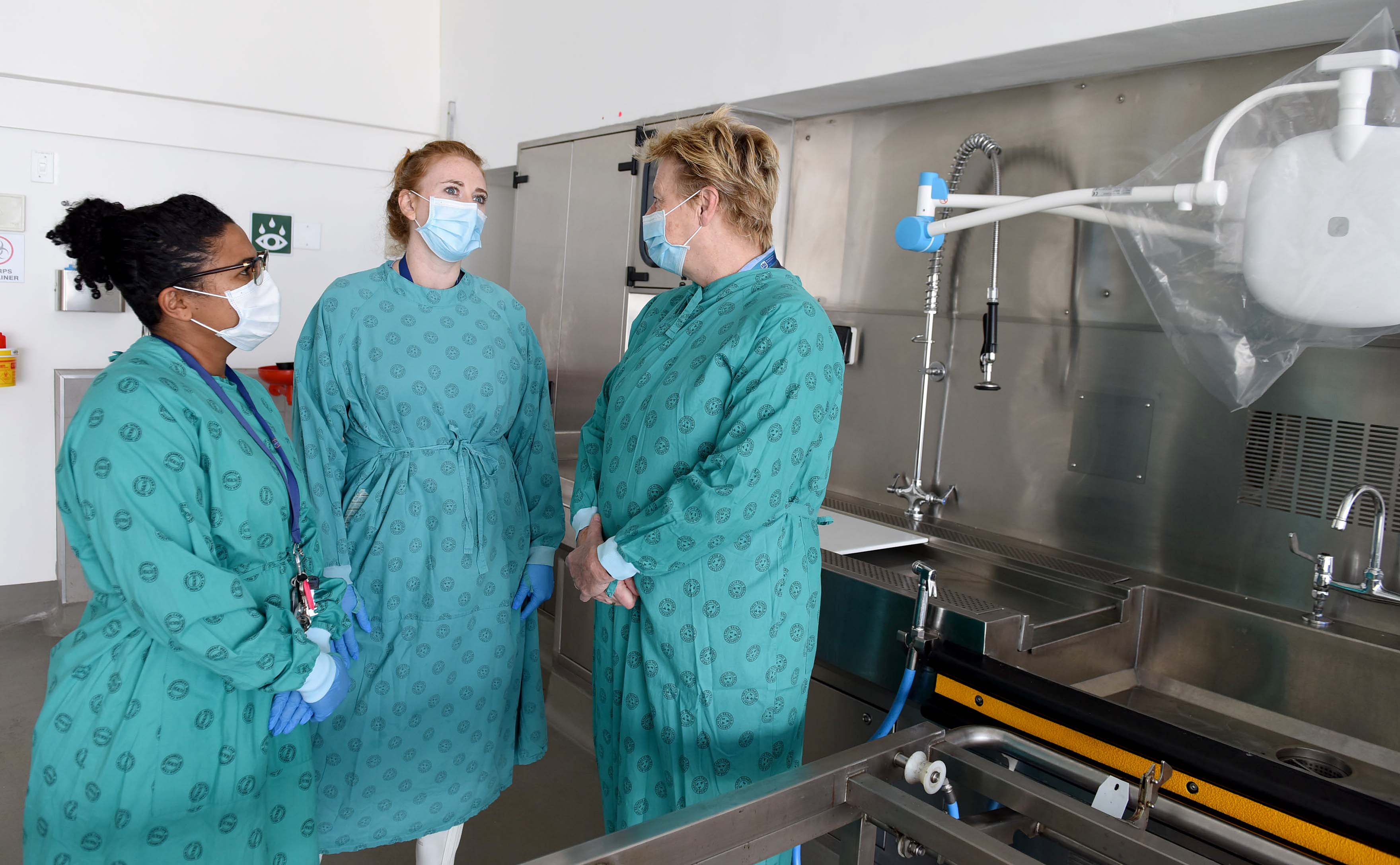
Professor Lorna Martin (right) and some team members at the Observatory Forensic Pathology Institute. (Photo: Nasief Manie / Spotlight)
The Salt River Mortuary was officially decommissioned in December.
“Toward the end, it was held together with duct tape and elastic bands,” says Martin.
That notwithstanding, they completed 4,500 autopsies last year. Under Martin’s watch, a team of 10 doctors perform up to three postmortems each per day.
A glint of steel
Martin has wispy hair and a glint of steel in her eyes. She matriculated in Boksburg on Gauteng’s East Rand. Her speech is enthusiastic, occasionally punctuated with wry jokes.
“I’ve learnt not to wear white jeans to crime scenes,” she says.
She explains that when an individual dies suddenly or of unnatural causes, a medico-legal investigation is required by law to identify the deceased, determine the cause of death, and secure evidence should there be a criminal investigation.
A 10-minute walk from the frosted glass-fronted Ofpi in Main Road, Observatory, Martin sits behind a large desk inside the University of Cape Town’s Falmouth building. It is warm in her office.
“Sorry, I don’t have air conditioning,” she says.
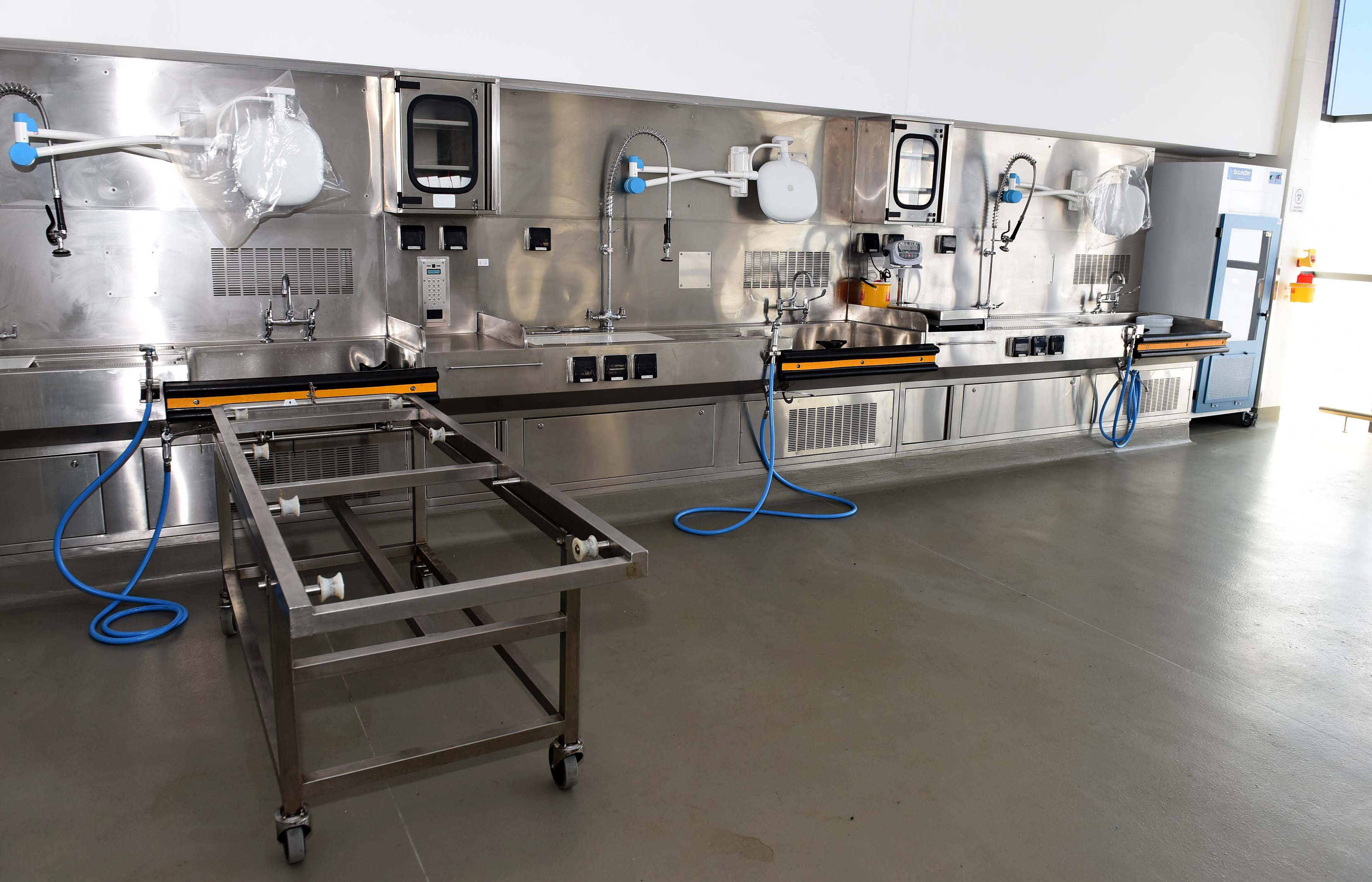
The nearly-R300m facility has four large dissection areas and space for six autopsies each. (Photo: Nasief Manie/Spotlight)
In front of her are stacks of papers and a box of Kleenex. A shelf holds books bearing titles like Autopsy Diagnosis and Technique and People & Violence in South Africa.
Surfaces are littered with keepsakes: among them, a twirling Spanish figurine and a teddy bear – gifts from visiting academics.
Martin points out a framed Femina article from 2008 titled: “To Deal with Death Every Day” and a 2001 White Ribbon Award for making a difference – “Together we will end the violence against women and children in South Africa” reads the certificate.
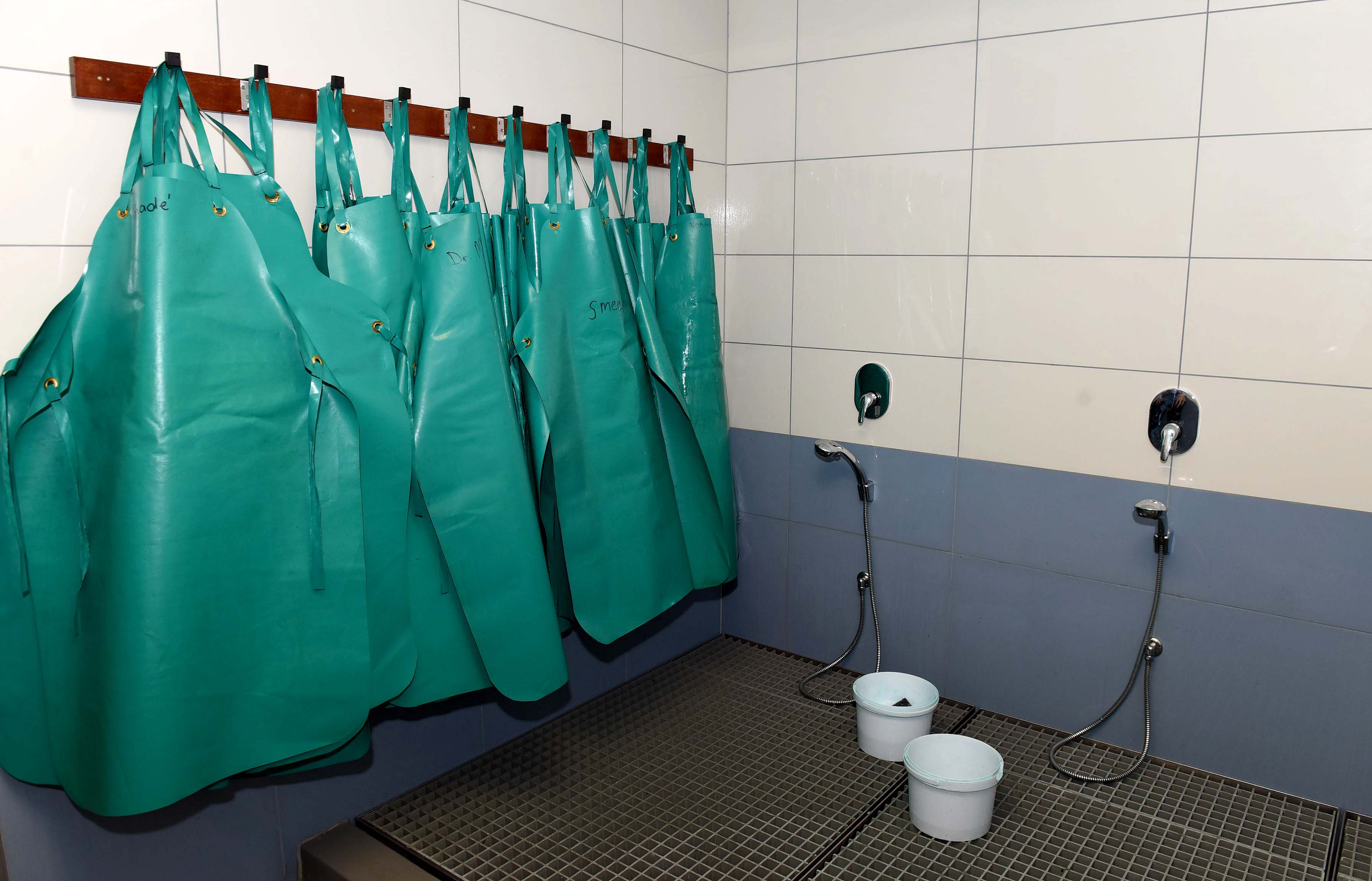
The facility also has a secure section for dealing with deaths from TB and other contagious pathogens. (Photo: Nasief Manie / Spotlight)
Martin has headed the division of forensic medicine at the University of Cape Town for the past 20 years, a legacy apparent in the packed space around her. At the time of her appointment in September 2004, aged 39, she was the first woman head of forensic pathology in South Africa.
The city’s underbelly
To a pathologist, a city’s underbelly is revealed – human bodies become demographics detailing its public health hazards and most vulnerable citizens.
For all the high-profile postmortems Martin has done, it would appear the plight that cuts deepest for her is that of women and girls who succumb to violence.
“What stays with me is not what most people think of as the ‘gruesomeness’ of the job,” says Martin, “but rather the deed that ended someone’s life. I’ll always wonder how people can do these things to each other, and am disturbed by the lack of dignity or sanctity in those deaths.”
She relays how it is not unusual for her to wander around hardware stores, looking for objects that may have inflicted particular abrasions or wounds.
“I was in Scotland working in Dundee for nine weeks; there was one murder in that time,” she says, “and the young man who’d been killed was beaten – he was kicked and stomped on. And we found that the pattern of the abrasion on his head was the perfect imprint of one of the suspect’s shoes.”
From Newcastle to Hillbrow
Born in Newcastle in the United Kingdom to an electrical engineer father and a mother with secretarial skills, Martin’s childhood was nomadic, veering between England, Zambia, Malawi and South Africa where she matriculated at St Dominic’s Catholic School for Girls in Boksburg in 1982.
She says her early hopes of becoming a veterinary surgeon were quashed as this qualification was only offered in Afrikaans (at the University of Pretoria’s Onderstepoort campus). Instead, she enrolled at Wits University’s medical school.
In her fourth year, an extraordinary teacher, Dr Patricia Klepp, would inspire Martin’s passion for forensic medicine – a journey that officially began in Hillbrow in 1991, where she took a job as district surgeon.
“There was so much action in Hillbrow,” Martin recalls, “so much change… I mean, there were those bombs. I used to examine all of the people who were in police cells, as a GP. So I saw extreme leftwing and rightwing activists.
“There was a lot of torture. People alleging they’d been tortured by police, especially at Brixton [police station]. And when they died, you had to prove or disprove [the torture]. Another thing we saw was sexual assault survivors, which was also just unbelievably bad. It was so inhumane – no dignity, no privacy… it was horrible.”
At the time, the SAPS had offices at the Old Fort prison complex in Hillbrow – the incarceration site of several high-profile political prisoners. Today, it’s home to South Africa’s Constitutional Court.
Martin recalls how, at the time, the law called for drunk drivers to be tested at all hours – with district surgeons being called out in the middle of the night to test blood for alcohol content. At the same time, rape survivors had to wait until 2pm on weekdays before being attended to.
She recalls arriving at the Hillbrow police offices on Mondays at 2pm to find a line of 20 or 30 women waiting on wooden benches to be examined for assault.
In 1993, at the new district surgeon’s premises, Martin helped kickstart a 24-hour service for rape survivors, also assisting police in devising a standard sexual assault examination kit.
In 1996, she moved to Cape Town. Her 1999 Master’s dissertation at UCT was on rape and rape homicide. Here, her mentors included Prof Lynette Denny, former head of UCT’s Department of Obstetrics and Gynaecology.
Together, they developed guidelines around the medico-legal management of rape survivors that would inform national policy.
Forensic pathologists in SA
Martin notes that there are only 54 registered forensic pathologists in South Africa. Her eyes light up as she speaks of some of her former students who are now heading pathology services around the country.
Martin collaborated on the 3rd Injury Mortality Survey: A national study of injury mortality levels and causes in South Africa in 2020/21, which notes an estimated 52,884 injury deaths in that time around the country, with homicide (41.8%) and transport-related deaths (22.1%) the leading causes, and suicide at 12.8%.
The report found that hanging was the most common mechanism of suicide among men, with poison ingestion the most common for women.
It found that most suicides occurred on Mondays.
For her, the Ofpi is the realisation of a long-standing goal.
“Since 2004 when I was appointed, the idea of a state-of-the-art facility was there in my head. I was very lucky… I travelled a lot for work, so I got to see facilities and even got architectural drawings from contacts in Toronto, Baltimore and Sydney… Even when I was on holiday, I’d go and see mortuaries,” she says with a grin.
When not probing the secrets of the dead, Martin enjoys walking her Golden Retriever and Swiss Shepherd around Cape Town’s southern suburbs. She lives in Plumstead.
In response to questions from Spotlight, Western Cape Health and Wellness spokesperson Megan Davids said despite an initial capacity of 165, at the time of decommissioning, the Salt River Mortuary had space for storing just 84 bodies. The new Ofpi can accommodate 405.
She said that currently, the Ofpi does not have a backlog. There are 19 cases awaiting postmortem examination, which equates to less than two days of work. DM
This article was published by Spotlight – health journalism in the public interest. Sign up to the Spotlight newsletter.






















 Become an Insider
Become an Insider
Comments - Please login in order to comment.